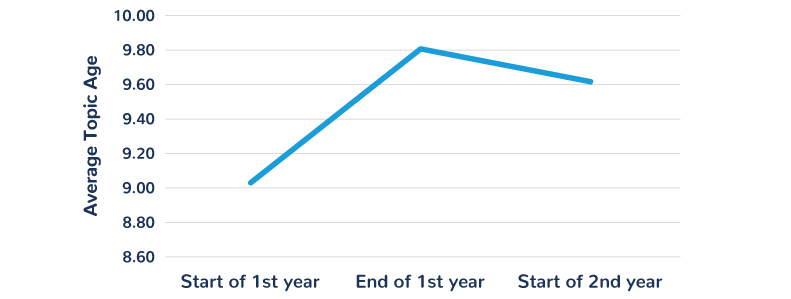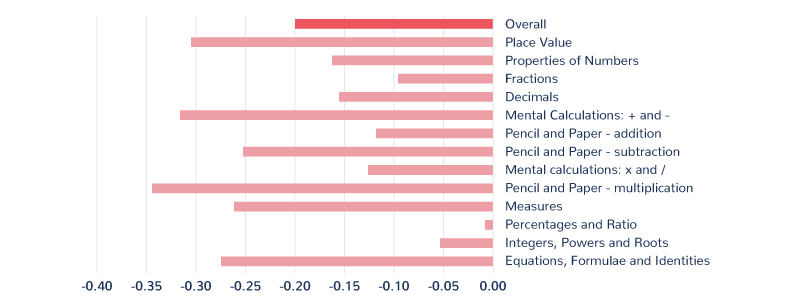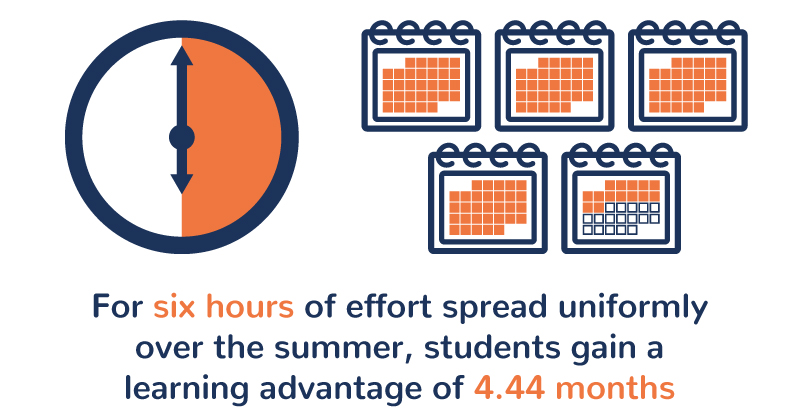There’s nothing quite like a long summer break to undo the hard work that students and educators have put in throughout the academic year. The phenomenon of ‘summer learning loss’ is well established in the literature, which suggests that students’ maths knowledge drops by as much as 2.6 months when they do not actively engage in learning over the summer.1
Our approach to quantifying summer learning loss
Data from the Maths-Whizz virtual tutoring platform reinforces this research. To derive our own estimate of summer learning loss, we looked at students studying using the Maths-Whizz programme who a) had an active profile on Maths-Whizz during an academic year no earlier than 2014-15, b) showed no activity over the summer and c) were then reassessed on the system at the beginning of the following academic year. The difference in a student’s Maths Age between the start of the new academic year and the end of the previous academic year is thus a measure of their learning differential between those two time points.
The findings below are based on a sample of 681 UK students who met the strict criteria for inclusion. We have no reason to suspect the trends would differ markedly in other regions, though this is a topic for future research.
Key findings
Students experience an average drop of 0.20 in their Maths Age per topic, corresponding to 2.4 months of lost learning, in line with the literature.

A drop is experienced in every assessed topic (Figure 2). The greatest loss is seen in Pencil and Paper – multiplication (0.34 years) and the smallest loss is observed in Percentages and Ratio (0.01 years). Further research is needed to ascertain the reasons why these topics stand out at either end.

The difference a summer learning plan can make
Our research shows that students who use Maths-Whizz for 60 minutes a week improve their Maths Age™ by, on average, 18 months in their first year of use. Extrapolated over the 6-week summer period, students who engage with Maths-Whizz during that time can be expected to advance their learning by nine weeks. This amounts to 0.17 years of acquired knowledge, compared to 0.20 years of lost learning for those students not actively engaged in a summer learning plan.

This means that for six hours of effort spread uniformly over the summer, students gain a learning advantage of 4.44 months over their peers who are inactive during the same period. That is approximately three weeks of learning for every hour invested – an astonishing rate of return.

What is your summer learning plan?
Summer is a time, of course, to relax and unwind. But given our findings, we reject the notion that it is a time for students to switch off from learning altogether.
The summer period represents huge untapped potential for learning. We challenge all educators to consider what engagement plans you have in place to ensure your students consolidate and build on their learning over the summer, rather than have it slip away.
1 Cooper H., Nye B., Charlton K., Lindsay J., Greathouse S. (1996). The effects of summer vacation on achievement test scores: A narrative and meta-analytic review. Review of Educational Research, 66(3), 227–268. http://journals.sagepub.com/doi/10.3102/00346543066003227
